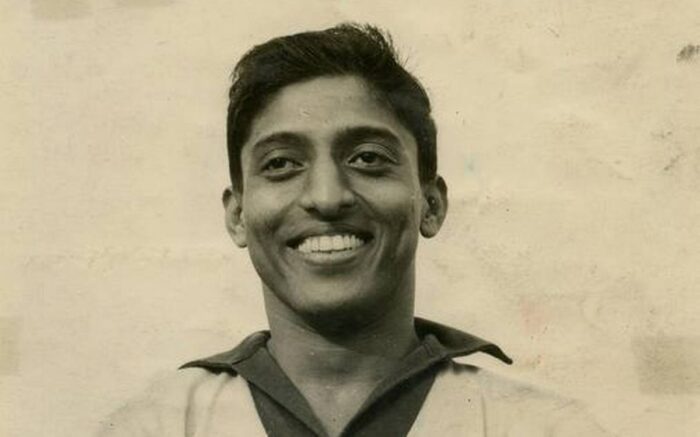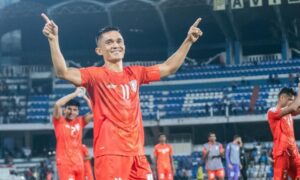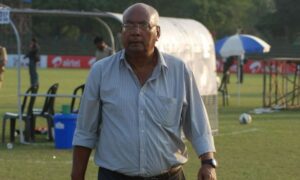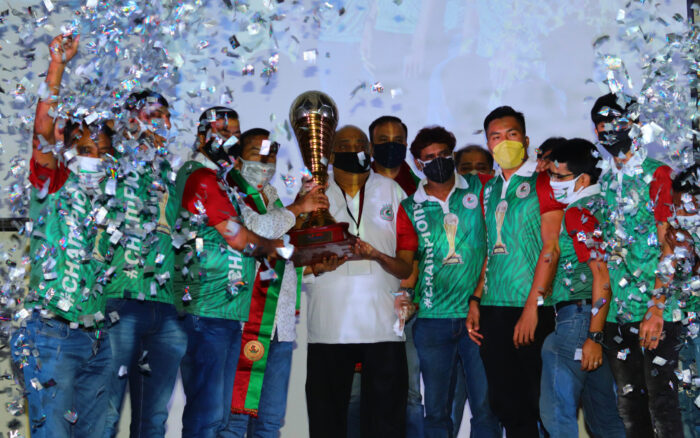
File Picture
” Chuni Goswami is no more” a cousin informed me last night from Kolkata .
I felt a deep sense of personal loss as my mind went back to the Calcutta of 1950’s and 60s. It was a different world from today’s Kolkata. Then football was not just a game to be played in the afternoon by some either casually or for a purpose. No,it was played for sheer joy and with all seriousness as wherever there was some open place in Calcutta or small towns and villages across Bengal one would notice boys playing football even when raindrops were falling around. Football was played not for money but as a form of social engagement of the young in a vigorous game ,encouraged and watched by the community especially when there’s an inter school or inter village match. This community participation gave Bengal football a distinct socio cultural flavor as seen in Mohun Bagan- East Bengal rivalry . And all along the Calcutta suburban railway lines one would see football being played in towns like Howrah, Hoogli, Baranagar ,Khardah ,Chandan nagar,Burnpur and Diamond Harbour . A vigorous football culture grew here enabling footballers from villages and small towns to make it to Calcutta – the ” Mecca of the Indian football” as it was every Indian player’s dream to don the jerseys of leading teams like Mohun Bagan, East Bengal or Mohammedan Sporting . But above all it was love and passion for football that was infectious. ” Come rains and thunder I will be on the ground every day sharp at 4 PM with the Ball for you to come and play” was every Captain’s vow. Chuni Goswami was a product of this Football crazy environment.
Chuni, the nickname of Subimal Goswami was born on January 15. 1938 at Kishoreganj, now in Bangladesh. A born Footballer, his skills in swerve and dribbling caught the eye of Bengal and Mohun Bagan’s legendary football coach and talent spotter, Balai Das Chatterjee when Chuni was just 8 year old and Chatterjee enrolled him to Mohun Bagan junior team. Chuni displayed unparalleled capacity for hard work and the will and determination to excel in which he received full support from his parents as he grew up to manhood. He would wake up early at 4am daily ,walk up to Kalighat Trum Depot to run along the Tram track’s green patch to reach Esplanade Terminal and then to Mohun Bagan club in the Maidan to do practice and play. Once it’s done,he would rest, bathe and proceed to Ashutosh College in South Calcutta to attend classes. He did well in examinations too. This drill made his body lithe and any head on physical contact with him during play was like hitting against a steel frame, recalled a friend who played once against Chuni’s college team in early days. When I see Lionel Messi swerve and dribbling I remember Chuni as his moves with the ball were about the same.
Let’s now recall a few of his outstanding achievements. Chuni Goswami played for Mohun Bagan in first division Football non stop from 1954 to 1968 in Right in position in the forward line, had never even thought of moving to any other club and declined the offer to play for Tottenham Hotspur in the prestigious British football league. He led India to win Gold at the Asian Games at Jakarta and was instrumental in the first goal scored by PK Banerjee in the final against South Korea and India won by 2-1, Silver in 1964 Asia cup in Israel and played for the Indian team at the Rome Olympics in 1964 . Chuni in his career scored 11 goals for the national team in about 36 matches he played and captained in 16 matches, scored 199 goals for Mohun Bagan- 145 goals in Calcutta Football league,25 in IFA shield ,18 in Durrand cup, and 11 in Rovers Cup Tournaments.
That was indeed the golden era of Indian football when PK Banerjee, T. Balaram, Chuni and Jarnail Singh took Indian football to its highest glory.
Chuni was versatile. He excelled in cricket as a first rate All rounder- a steady batsman, an aggressive medium pace bowler and a superb fielder which enabled him to lead Bengal twice in Ranji Trophy Final in 1971 and 72 . He scored 1592 runs in first class cricket and captured 47 wickets. We will never forget his sterling performance in the match against Gary Sobers led mighty West Indies in 1966 when Chuni played for a combined East and Central Zone team under captaincy of Hanumant Singh in Odisha. The west Indies team had ace players like W. Hall and Griffiths. Chuni took 5 wickets in the first , 3 in the second innings and was responsible for limiting West Indies to 136 runs in the first and 103 runs in the second innings and the historic victory of the Combined Zone. This was totally unexpected as at the most the BCCI thought of providing West Indies a ” good Warm up match” but a crushing defeat – No way. That was Chuni who had the potential to become India’s Dennis Compton, the great English cricketer who played for the English National football team. And this is not all: he was an excellent Tennis player at Calcutta’s iconic South club and a first division standard hockey player. Old timers recall Chuni picking up the hockey stick when ever a regular player was absent to play for Mohun Bagan hockey team in Calcutta first division league along with David to take on legendary Leslie Claudius led Calcutta Customs and with success. He is indeed India’s ” greatest ever All rounder sportsman”.
In life Chuni Goswami was gentle, suave and soft spoken. I had an opportunity to see him play in an Exhibition cricket match at Nowgong in Assam where I was Deputy Commissioner way back in the cold season of 1977 when he and the great fast bowler “Shute” Banerjee took the field. During Tea I had a brief chat with him: what impressed me was his gentle manners, quiet confidence and a determined look. Earlier when I was to ceremonially inaugurate the match Chuni Goswami was introduced as the” Pride of India” – the words that would always ring in my ear. And how true- a real ” Bhadralok” of the golden period of Indian football- our one and only Chuni Goswami– India’s pride. May his soul rest in peace .
[the_ad id=’22723′]

















